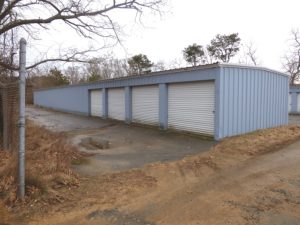EASTHAM — A new 4,800-square-foot storage unit building proposed by Barbara Niggel, the owner of Willy’s Gym, will be dropped from the project currently before the planning board after an informal poll of the members showed that they intended to refer the project to the Cape Cod Commission.
Representing Niggel and her companies, Goeroe’s Goldens LLC and Stow Away LLC, attorney Ben Zehnder disagreed with an opinion from the commission that the new building’s area should be included in calculating the “disturbed area” of the development. If that number hits 40,000 square feet, referral to the Cape Cod Commission is automatic as a development of regional impact (DRI).
Zehnder said Niggel had intentionally planned to locate 160 portable metal storage pods of various dimensions to cover 39,615 square feet, just below the 40,000-foot threshold, to avoid the mandatory referral.
“I don’t think that’s a correct interpretation,” Zehnder said of the commission’s opinion. “That’s not an argument I’m going to prevail on in front of this board. That’s an argument we may prevail on in front of the Superior Court if, in fact, there’s a referral to the Cape Cod Commission based on those calculations — or we may elect to present this lower intensity proposal and then seek a declaratory judgment from a Superior Court about that mandatory DRI threshold.”
With the building off the table, discussion focused on potential contamination of groundwater from hazardous liquids or petroleum products that might be stored in the units. The storage units would be located on a gravel surface.

The property, located in the Eastham Corridor Special District, is also in the groundwater protection overlay district, including the protection area for the town’s wells.
“If the applicant wants to prove his property does not drain into the aquifer protection area, he’s more than free to do that with documentation,” said planning board chair Dan Coppelman. “I don’t believe he’ll be successful, but that’s what it does say in the rules.”
Zehnder said leases would prohibit the storage of hazardous materials and petroleum products.
“From what I’ve seen of self-storage facilities, nothing is regulated,” said Coppelman. “People go in and out as they wish. Nobody’s monitoring the situation.”
Coppelman said he would ask for a monitoring program to ensure tenants are abiding by their leases.
Zehnder said a program of inspections could be put into the leases but that it would be difficult to implement, as people put their own padlocks on their storage units. “You’re talking about us having a protocol for every key to every unit,” asked Zehnder.
“I’m asking you to solve the problem,” replied Coppelman.
“I don’t think there is a problem,” replied Zehnder. “We’re not allowed to store dead bodies in there either, but we’re not having a protocol of ‘Do not store dead bodies.’ ” He added that a recent Google search found no news in the last 30 years of hazardous waste being spilled from storage units on Cape Cod.
The monitoring program could be a reporting system signed by the owners of the storage units annually, indicating there wasn’t any hazardous material in their units, noted Coppelman.
“I will tell you, I am relentless on protecting this aquifer protection zone,” said Coppelman.
The hearing was continued to the board’s July 21 meeting.



